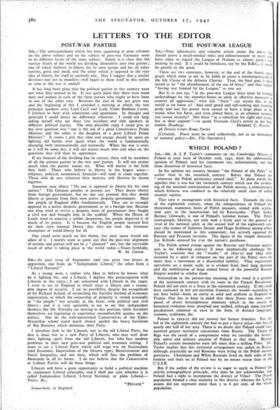LETTERS TO THE EDITOR
POST-WAR PARTIES
Snt,—The correspondence which has been appearing in your columns on the above subject and on the subject of post-war Germany seem to be different facets of the same subject. Surely it is clear that the various States of the world are dividing themselves into two parties ; one of which believes in liberty for its own nation and for all other nations, great and small, and the other which is opposed to the very idea of liberty, for itself or anybody else. May I suggest that a similar division—not yet so manifest—will begin to show itself in this nation as soon as the war is ended?
It has long been plain that the political parties in this country were not what they seemed to be. It was quite plain that there were some men and women in each of the three parties who ought to have been in one of the other two. Between the end of the last great war and the beginning of this I attended a meeting at which the two principal speakers were Lord Cecil and Lady Violet Bonham Carter. I listened to both with admiration -and agreement. In thought and principle I could detect no difference whatever. I could not help asking myself why are these two excellent and able speakers in different political parties. The only plausible reply I could give to my own question was " one is the son of a great Conservative Prime Minister and the other is the daughter of a great Liberal Prime Minister." It seems a pity that time and energy should be spent on fighting old battles over again when the world is fundamentally changing both internationally and nationally. When the war is over, as it will be some day, it will not matter much who said what on the questions that will then be uppermost.
If my 'forecast of the dividing-line be correct, there will be members of all the present parties in the two new parties. It will not matter much what the parties' names are. What will matter is the faith they hold. Those who believe in liberty in the largest sense— religious, political, economical, financial—will tend to come together. Those who do not, whatever their motives, will likewise be drawn together.
Someone may object " No one is opposed to liberty for his own nation." The German peoples at present are. They desire liberty from foreign government, but no one can pretend that they desire liberty at present from their own native despotic government. Here the people of England differ fundamentally. They are as strongly opposed to a native despotic government as to a foreign one. Because one king tried to revive a despotic form of government they fought a civil war and brought him to the scaffold. When the House of Lords tried to exercise a milder despotism, the people deprived it of much of its power. It is 'because the English people insisted first on their own internal liberty that they are now the foremost champions of world-liberty for all.
One could write much on this theme, but your space would not allow of it. I merely want to point out that the post-war alignment of nations and parties will not be a " planned " one, but the inevitable result of what is taking place in the world today.—Yours faithfully, W. M. CROOK.


























 Previous page
Previous page